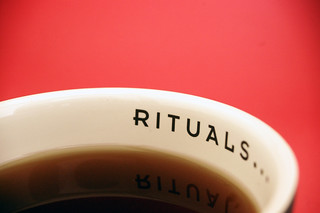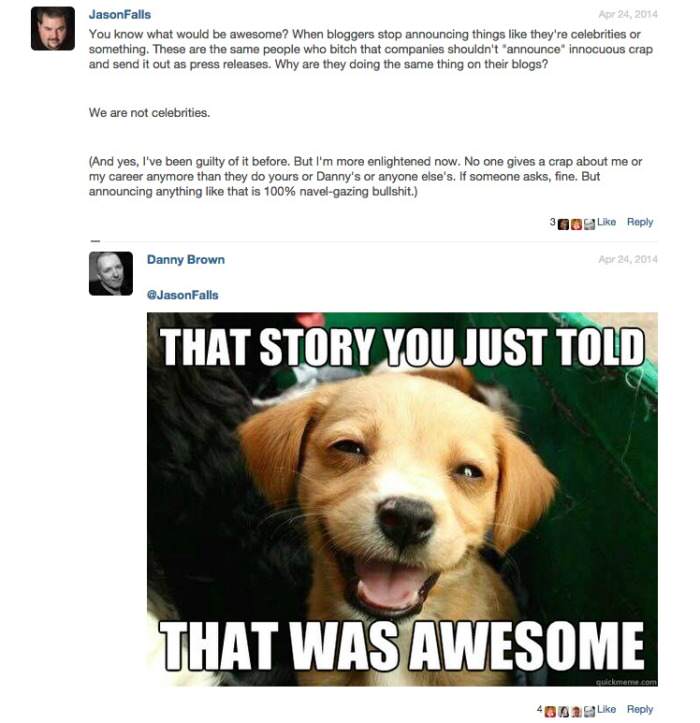Guyside: The Beautiful Freedom of Not Giving a Crap
When I was much younger – say, around 8-9 years old – I used to get in trouble with my school teachers, and other adults in positions of authority, regularly. Pretty much not a day would go by without my mother receiving some troublesome news about me.
I guess, looking back, I simply had an aversion to authority.
And while that continued until my early teens, when I learned what it meant to really show respect and understand conflict with authority was primarily in my mind, I also learned something at that young age that must have made an impression (even subconsciously) from my granddad.
Wisdom Has No Age Limits
I always loved my granddad. He was the safety net I’d cling to when everyone else seemed down on me. He was the one that would let me watch TV just that little bit later. He was the one who would let me read my comic under the bed with the flashlight, when everyone else would confiscate the flashlight.
In short, he was the one that would break the rules and let me be who I wanted to be. Except, not really.
Instead of letting me be an out of control tearaway, looking back he was actually guiding me to be a better person because of the trust I had in him. When he spoke, I’d agree and nod – even if I didn’t like it. And – usually – do as he said.
Whether or not my mother was in cahoots with him in this endeavour, I’ll never know. Perhaps, perhaps not. Either way, he made me stop and think of the things my mother was trying to teach me.
So, when I was having my brush with people in authority, my granddad pulled me aside, and said the following:
You might think grown-ups are bad, and stopping you from having fun. And, sometimes, they will. But it’s only because they love you. Now – you can choose which ones to listen to. And, I know not everyone is worth listening to. So here’s a trick – listen to the people who love you, every time. Your mum. Your sister. Me. Your grandma. Listen to your friends, but only the ones who don’t make you feel bad about yourself. And listen to your teachers who make you smile when you’ve done something. These people are all just trying to help you enjoy life. And that’s something not everyone will do.
Now, I know I’ve paraphrased some of his words. After all, this was almost 40 years ago (holy crap, I’m getting old!!). But the gist of the message is definitely there.
And it’s one I use today in pretty much everything I do, and you should too. Here’s why.
Living Life The Way It’s Meant to Be Lived
In a recent edition of TIME, there was a fantastic memorial article by David Von Drehle, about a gentleman named Charlie White. David and Charlie were neighbours, and David’s piece wrote about the lessons Charlie instilled from a life well lived. Charlie was 109 when he passed last month.
The article recounts passages of time from the turn of last century, and is a fascinating and warm look into a period of time most of us will never have known. Yet it’s also a reminder of how to live a life well lived.
Charlie’s “secret” to a happy life was the realization that you have to separate the things you can’t control from the things you can. This was a lesson he imparted to one of his daughters when she was having issues with someone that was frustrating her. Charlie’s advice?
You can’t change people like that. If I let people irritate me, I would have been dead long ago. Source.
The fact Charlie lived such a long and happy life has to have some part in this mindset. It’s the same mindset my granddad had, and is – essentially – the one I try to live to these days.
After all, let’s face it – how important are the words of others who actually have no real impact over who we are and what we stand for?
Those That Matter and Those That Meh
Back in April of this year, I wrote a post on why readers of this blog might want to unsubscribe. It was a post that shared the direction this blog was moving in, and a heads up that if readers wanted to subscribe to a purely marketing blog, this one wouldn’t be for them (and I recommended five other blogs to subscribe to instead).
I’d just become bored of only writing about marketing, social media, etc., and all that entails. We’re people, all of us – we’re not tied to talking about just business in life, so why should we be on our blogs (or other social footprints)?
After this post, I received a whole bunch of emails (as well as comments on the post itself) from others who felt the same, and were “glad” to see someone say it out loud, encouraging them do the same thing. And that’s the real beauty of blogging and content – even if you help just one person make a choice, that’s all that matters.
Arik Hanson, a PR and communications pro over in Minneapolis, shared his thoughts in a post entitled “Is the age of the independent PR blogger over?”. He looked at how many of the bloggers in his feed had either changed direction, or simply given up altogether to concentrate on, well, life and family and all that important stuff.
In the comments, social media guy Jason Falls left quite the entertaining diatribe (click image to expand).
When I got the update to the comment being left, it made me chuckle – because, really, who gives a crap?
It doesn’t matter what Jason thought (and I like Jason, he seems a decent guy), because it wasn’t for him (hence the dog picture reply). The original post was for the folks who said it helped them make up their minds to produce the content they really wanted to produce.
And that’s why we need to collectively take more of a “who gives a crap?” approach to comments, blog posts, social updates, etc. The people that moan and react usually aren’t the ones that either matter (from an audience point of view), or who have little relevance to you anyway.
If someone on Google+ calls you an idiot for having a point of view, who cares? The real idiocy comes from trying to stifle opinions with rudeness or ignorance. If that person has little effect on your bigger picture, let them stew in their own little miserable bubble.
Same goes for the content you produce. Own it, and be happy to own it.
Enough With the Egg Shells
There was a great post earlier this year from Marc Ensign, called “The Pussification of the Internet”. In it, Marc shares how the web has become this place where we’re too scared to have an opinion, because we’ll be jumped on by others, or called to task, etc.
Because of this, the web is in danger of becoming a sanitized version of what it should be – open, challenging, questioning and, most of all, bare bones honest. It’s a great – if not quite safe for work read – and well worth your time,. Because it’s true.
Last month, the Pew Research Internet Project released its latest report, and it made for some enlightening – and a little bit scary/sad – reading.
Entitled “Social Media and the Spiral of Silence”, it shared the answers of just over 1,800 adults and their thoughts on the impact of the Edward Snowden / NSA fallout in the US and beyond, and how that affected the way these adults conversed online.
There are many interesting takeaways from the report, but two in particular stood out.
- In both personal settings and online settings, people were more willing to share their views if they thought their audience agreed with them. For instance, at work, those who felt their coworkers agreed with their opinion were about three times more likely to say they would join a workplace conversation about the Snowden-NSA situation.
- Previous ‘spiral of silence’ findings as to people’s willingness to speak up in various settings also apply to social media users. Those who use Facebook were more willing to share their views if they thought their followers agreed with them. If a person felt that people in their Facebook network agreed with their opinion about the Snowden-NSA issue, they were about twice as likely to join a discussion on Facebook about this issue.
Now while these two points refer to unease on how the US government is monitoring the conversations of its citizens, it also highlights the growing issue of just going with the flow as opposed to taking a stand.
It’s a walking-on-egg-shells mentality that both limits our growth and inhibits our learning. If we were all meant to have the same point of view, we may as well quit now because there would be no need for us to be.
That’s not to say we ignore everyone else – far from it. But we do need to start standing up for ourselves and our opinions more, and not just be part of the herd.
Like my granddad said himself, think of who you want to listen to. Think of who you want to take advice from. Think of who actually matters, and whose opinion and feelings you wouldn’t want to hurt. And be respectful of those you disagree with.
For everything else – who gives a crap?
This post originally appeared on dannybrown.me.
Read MoreGuyside: What is it that power does again?
Oh yes. Corrupts.
Up here in Canada, people of a certain age and persuasion have been bathed in utter sordidness for the last week, as one of the stories I wrote about last week — that of national radio host Jian Ghomeshi — has gotten worse, and worse, and then worse again.
To recap: Ghomeshi was the host of a nationally-broadcast show on CBC Radio (and on 180 or so NPR stations in the US), a regular contributor to the CBC’s national TV newscast, and a host of a number of high-profile cultural events. He was the personification of an organization seeking a younger, hipper demographic. About a week ago, it was suddenly announced that he was taking an indefinite leave. The immediate assumption was that he was taking time to deal with his father’s recent death.
But by Sunday, he’d written a 1600-word Facebook post that said he was fired, and fired because of revelations of his private sexual behaviour (what he described as being “adventurous in the bedroom”) made by a jilted ex-girlfriend. By now, he’s been the subject of allegations of both workplace sexual harassment and of assaultive behaviour with women in his life, some of whom remain anonymous and some of whom have gone public. His career is in tatters, he’s gone to ground, a Toronto police investigation is underway, his former employer has launched a major inquiry, and a national conversation has begun, thanks to the Twitter hashtag #beenrapedneverreported.
So this is about power. If the allegations against Ghomeshi are true, it seems clear that his power as a media personality allowed him to behave in a reprehensible way with little fear of being “called out” for it. In fact, one producer on his radio show who reported harassing behaviour was allegedly told “he’ll never change, so what can you do to make the workplace less toxic?” by the show’s executive producer.
So here’s the thing. If you are a man who is abusive of women, a sexual harasser, not much I will say here will resonate. But I’ll simply say STOP. Stop what you’re doing. But if you’re not, if you’re horrified by the thought that women are dry-humped in the workplace, that a male colleague would whisper in a female colleague’s ear “I want to hate-f*** you,” etc.: then you’re with me. We need to stop tolerating this in our fellow men. We need to be the sunlight that disinfects the places we work and live to ensure that EVERYone can work and live without fear of assault; we need to be willing to make noise.
If there’s something that this whole tawdry story has taught — or can teach — men, it’s that THIS IS NOT JUST A WOMEN’S PROBLEM. And as I edge toward being a “senior” person in contexts, I’ve realized that while whatever power I possess can corrupt, it can also disinfect, if I have the courage to use it. Who’s with me?
Read More
Guyside: the power of ritual
 I’ve mentioned in a previous Guyside that my mother died in August. And yesterday, my brother and I were informed that her house — our house — had sold. For me, it’s been an odd experience. It’s a home my grandfather built in the ‘teens and twenties in a small coal-mining town. My mom and her siblings grew up in that house; after getting married, my dad moved in, and my two brothers and I grew up there. Soon, I’ll be flying home (an ironic phrase, now) to do the final paperwork and hand off the house to its new owner.
I’ve mentioned in a previous Guyside that my mother died in August. And yesterday, my brother and I were informed that her house — our house — had sold. For me, it’s been an odd experience. It’s a home my grandfather built in the ‘teens and twenties in a small coal-mining town. My mom and her siblings grew up in that house; after getting married, my dad moved in, and my two brothers and I grew up there. Soon, I’ll be flying home (an ironic phrase, now) to do the final paperwork and hand off the house to its new owner.
Humour: pretty decent medicine

The Royals had court jesters to supply them with humour. What’s your source?
When I was a kid, my parents subscribed to Reader’s Digest. In addition to the “I am Joe’s Kidney” features, I remember the humour columns, like “Humour in Uniform,” “Life’s Like That,” and my joke-obsessed-kid favorite, “Laughter, the best medicine.” It’s still there, at least here in Canada. In addition to the monthly magazines, our house had a bunch of anthologies of funnies that would have come with “Reader’s Digest Condensed Books” (not to be confused with Condensed Milk, apparently).
I don’t know if those jokes got me into being funny early on, but something did. Humour has been part of my life pretty much as long as I can think, for both positive purposes — if you’re thought of as ‘the smart one’ in school, ‘the funny one’ is a big step up — and for negative — I spent a lot of years using jokes and humour to keep people away from any real feelings I might have had.
But when it comes to health, humour is pretty decent medicine. Trust me on this one. As a bladder cancer guy, I have had multiple people dealing with the areas I normally only show one person over a period of years — and being in a city with a med school and multiple health science programs means that you’re not only dealing with the urologist / nurse / sonographer / whatever, you’re dealing with residents / interns / students… Sometimes the only way to deal with the more embarrassing parts of the whole affair is to crack wise. I think it helps them too.
But there’s more to humour than just dispersing embarrassment. There’s lots of research that shows humour can help when you’re ill, and help before you get ill. One study of prostate cancer support groups found that for participants, humour is a way of sharing information about their health and feelings that doesn’t leave the men feeling vulnerable. Given what we already know about men’s unwillingness to be open about their health, that’s a valuable thing.
There can be a dark side to humour, though, especially as men sometimes use it. Sometimes jokes can be couched in mean or insulting terminology, and sometimes (as I know to my regret!) humour that works in one context doesn’t in another. I’ve made some jokes about cancer that have gotten a laugh from some people and dropped jaws elsewhere.
Ask yourself if you have enough laughter in your life. If not, find ways of seeking it out or making your own fun. It may not be the best medicine — if you have a heart attack, I’d recommend a bypass rather than a Marx brothers marathon — but it’s more important than you might think.
CC-licenced photo by Flickr user neiljs
Read MoreGuyside: Men, health, and denial.
 I can’t believe I’m writing a post here inspired by Rob Ford. And yet, here I go.
I can’t believe I’m writing a post here inspired by Rob Ford. And yet, here I go.
This is not about Rob Ford’s politics, or about his consumption of various substances both licit and il. This is about male denial around health issues. The famous (notorious?) mayor of Toronto’s 2014 re-election campaign was derailed by the announcement that a tumour had been discovered in his abdomen on September 9. The tumour is, apparently, being analyzed in preparation for treatment at a Toronto hospital.
One of the things that leapt out at me from the first stories about this latest roller-coaster development in the Ford story was this quote from a story in the Toronto Star:
Ford was complaining of “left, lower quadrant abdominal pain” for three months before the pain became “unbearable” Wednesday morning, Devlin said.
Since the initial tests on Ford, he’s also apparently had a lung biopsy, and an update on his health is expected later today (September 17, as I write this.)
Combine this with two other facts: one, that Ford’s father died in 2006 of colon cancer, and two, that Ford had a tumour on his appendix in 2009 that necessitated the removal of his appendix and part of his colon, and you have what appears to be the classic case of a man refusing to seek medical assistance. I’m no psychic, but I don’t have a good feeling about this.
In this, Ford is far from alone. A 2005 literature review in the Journal of Advanced Nursing showed that men are much less likely to seek medical help than women for disorders ranging from psychological disorders to physical disabilities. One UK study identified men’s refusal to seek help as the most important medical issue for men. And another UK report points out that while men are considered “advantaged” in many areas (salaries, for example), our health outcomes are worse than women’s.
Whether it’s machismo, stoicism, putting work or other factors before health, or something else, too many men are ignoring symptoms, assuming they’ll go away, or simply lying to themselves about their health. And it’s costing people their lives. One of the saddest findings of the Men’s Health Forum report is that when men do present themselves for assistance, the disease in question is too often at a later, more serious stage. Another sad fact is that men are far less likely to seek assistance for psychological conditions like depression.
When I first saw blood in my urine in 2006, I did two things: told my partner and went to my clinic. My bladder cancer was discovered at an early stage, and I’ve been lucky enough to not require radiation, chemo, or catheterization from more severe forms of cancer. If I’d shrugged off that first sign, what might have happened?
For your own sake, and the sake of those who love you: go to your doctor, your nurse-practitioner, or whatever other health professional you ought to go to, especially when something unusual happens.
Creative Commons-licenced photo by Flickr user Alistair Gilfillan.
Read MoreGUYSIDE TAKEOVER #3: Choose your masks wisely
I have been listening — against my will — to a lot of “new country” music over the last couple of weeks. And let me tell you, it’s not to my taste. My tastes are very broad when it comes to music, but 90 per cent of what I heard — from “Drunk on a plane” to “River bank” — I disliked.
And it got me thinking, all these songs. It reminded me first of this video that I saw a while ago: “Why country music was so awful in 2013.”
And then I got to thinking that this whole country music thing is an example of people putting on a mask that they want to be their persona. The concepts in country’s top hits right now don’t really relate to real life as I think of it. In Canada, we’ve never been more urban as a population. But the songs people seem to listen to are decidedly rural. People drive trucks that they rarely use for their original purpose, and trucks that are incredibly luxurious compared to those of the past.
I’m a folkie, and a lot of the music that I listen to seems to reflect my reality, and I feel (I am perfectly ready to admit I’m being hypocritical if challenged) that the country music hitting it big doesn’t reflect generalized reality.
Billy Joel once wrote:
Well we all have a face
That we hide away forever
And we take them out and show ourselves
When everyone has gone
I think men are more likely than women to put on those masks. From our hildhood we’re encouraged to do it. “Big boys don’t cry”, “be a man”, peer pressure: we’re pretty darn likely to find a persona that we put on to please others. I certainly did.
But the thing is — we don’t have to choose those masks, and we don’t have to live up to any pop culture stereotypes. Wanna be a cowboy? That’s cool. But look critically at the features of whatever mask you’re putting on.
Read More







